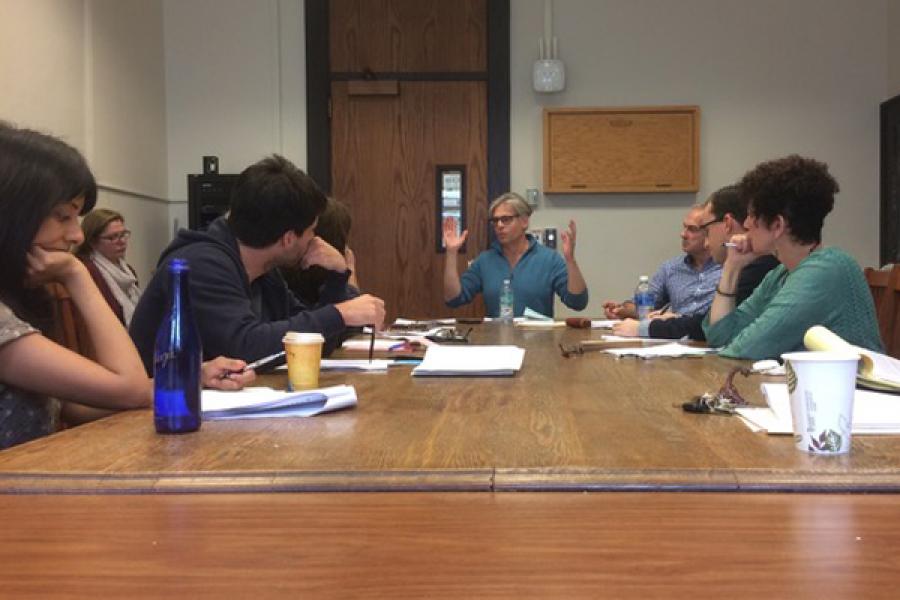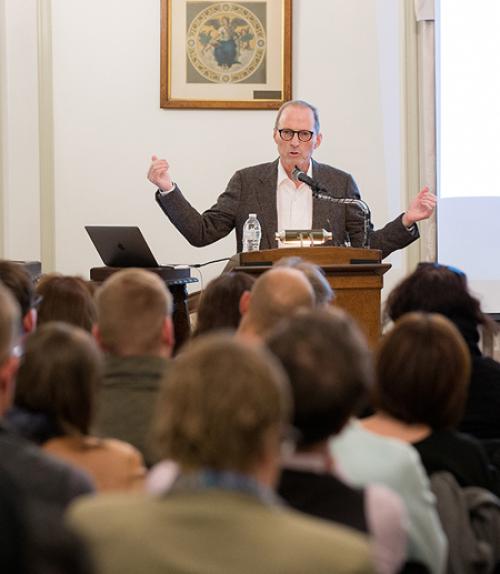Cornell has a history of hiring faculty with strengths and interests in German, not only within the Department of German Studies, but throughout the university.
So, 25 years ago, Professor Peter Uwe Hohendahl set about creating an institute that could bring faculty from across campus with interests in German together for conferences and colloquia to share ideas, opinions and research.
The Institute for German Cultural Studies is celebrating its 25th anniversary this academic year with a series of events and celebrations, which included a Nov. 29 visit by Michael Steinberg, president of the American Academy in Berlin, who delivered a talk titled “Martin Luther King in East and West Berlin: Analysis of an Itinerary (September 1964).”
“We have always had considerable strengths in German studies across many departments,” Hohendahl said. From music, art history and performing and media arts to philosophy, anthropology and sociology, faculty are teaching and researching on topics rooted in German culture. But faculty rarely worked together before the institute was established, except on hiring committees, he said.
The institute began its work in 1992 by organizing yearly conferences and bi-weekly lectures, readings and colloquia, which offer graduate students or faculty the opportunity to present papers and receive critiques. These colloquia are somewhat famous among many past graduate students as a place to refine your presentation, negotiation and questioning skills.
“The colloquium taught me how to be a good colleague with an omnivorous range of interests, and how to foster intellectual community,” said Paul Buchholz, MA ’09, PhD ’10, now assistant professor in the Department of German Studies at Emory University. “I can honestly say that there is no better venue for presenting and discussing new scholarship in our field.
“It gave me a sense of how to ask questions, how to engage critically and constructively with scholarly work that could be very different from my own work, yet also engaged with many of the same core questions.”
Hohendahl said the colloquia’s format allows for a short presentation by the paper’s author, then sometimes as much as two hours of discussion, unlike a traditional paper presentation.
“You can see thinking in action,” said Paul Fleming, professor of comparative literature and German studies as well as the Taylor Family Director of the Society for the Humanities. Fleming directed the institute from 2013-2016. “One learns how to think on one’s feet rather than simply protecting or defending one’s own work. You can see the way thought is negotiated in real time.”
Students learn not only how to present their ideas, but how to reconsider or refine their methodologies by receiving input from experts in the field, who come not only from Cornell but from other universities across the country and internationally. “Our graduate students are treated like faculty and, for them, it is a huge try-out,” Hohendahl said. ‘’The world in which these graduate students grow into is not necessarily a world of consensus.”
Because Cornell’s German department is diverse, the topics for colloquia presentations and lectures run the gamut – this year’s offerings include “Mirror Worlds: Reflections of Cinema,” “Kant and Posthumanism” and “Imagining Migration in Contemporary Europe.”
“Other major German departments don't tend to have this sort of regular event that brings together the students and faculty from the department and from the outside, to have what is ultimately a dialogue about the future of our field,” Buchholz said.
The colloquia, lectures and conferences bring experts from across the U.S. and abroad, Fleming said, because of the institute’s reputation. “When people come, they’re very impressed with the audience, the feedback and the discussion,” Fleming said. “And that results in an eagerness to present and discuss one’s ideas.”
Hohendahl said outside presenters often say how impressed they are by how well Cornell students have read their papers and prepared for the discussion.
Two of the most memorable conferences during the first 25 years of the institute were a 2001 event focused on public culture in Hamburg from late 17th century to early 20th century and a 2014 series on critical theory and post Colonialism done in collaboration with Natalie Melas and the Institute for Comparative Modernities.
The Hamburg conference happened just after 9/11, Hohendahl said, so many of the German presenters had to cancel. “But we had a group of really great young American scholars waiting in the wings,” he said. “And with the help of the music department, we performed a late 17th century opera. It was a great event that went beyond the academic.”
The series on critical theory and post Colonialism series of workshops “put the critical theoretical tradition of German in the center of the most contemporary pressing global debates,” Fleming said.
The institute also brings leading artists from Germany, Austria, and Switzerland to campus for extended stays as artists-in-residence. That artist-in-residence program, begun in 2003, allows artists to present their own work, conduct seminars on related subjects, and interact with students and other members of the Cornell community.
Both former directors say the institute’s size and small budget are sometimes a challenge, but also a benefit.
“Institutes can be nimble and fast and much more innovative than departments,” Hohendahl said. “If things work, we can run with them,” Fleming said.
In the last five years, the institute has added an exchange program for students with the University of Cologne , including summer school opportunities for undergraduates, as well as enhanced faculty and graduate student collaboration with the Humboldt University, Berlin, via its PhD Network. The institute also supports graduate students who attend the Boulder German Studies Summer Colloquium in Colorado.
In thinking about the next 25 years, Hohendahl said increased funding would allow the institute to bring in more visiting artists and filmmakers, or begin a new book fellowship program for a young author who will be publishing with “Signale: Modern German Letters, Cultures, and Thought,” a book series edited by Hohendahl in cooperation with Cornell University Press and Cornell University Library. The fellowship would allow an author to finish their work and graduate students the chance to learn about finalizing a manuscript.





